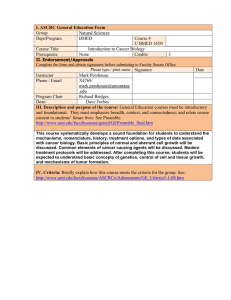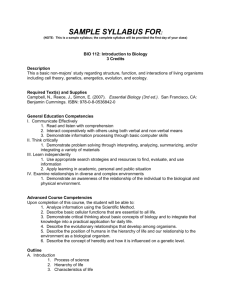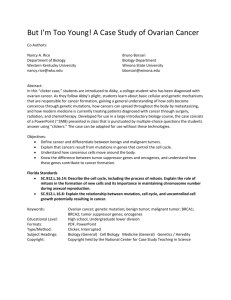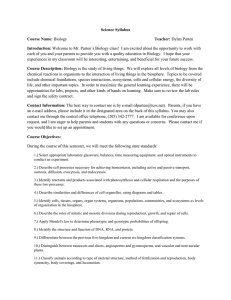I. ASCRC General Education Form Group Natural Sciences Dept/Program
advertisement
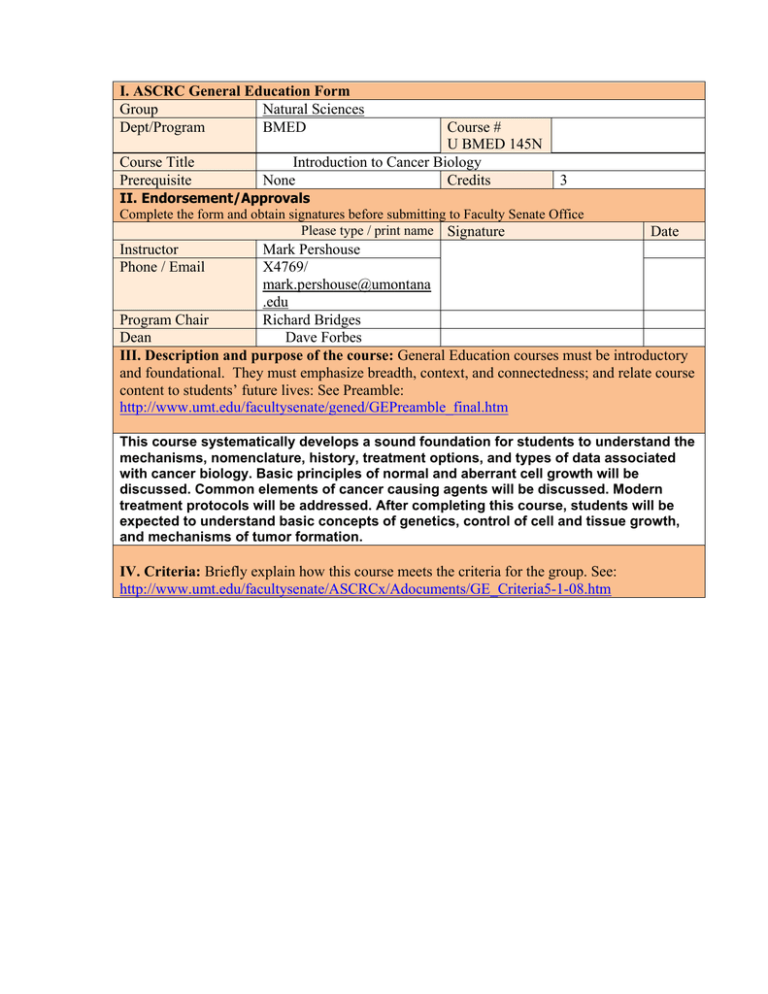
I. ASCRC General Education Form Group Natural Sciences Dept/Program BMED Course Title Prerequisite Course # U BMED 145N Introduction to Cancer Biology None Credits 3 II. Endorsement/Approvals Complete the form and obtain signatures before submitting to Faculty Senate Office Please type / print name Signature Date Mark Pershouse X4769/ mark.pershouse@umontana .edu Program Chair Richard Bridges Dean Dave Forbes III. Description and purpose of the course: General Education courses must be introductory and foundational. They must emphasize breadth, context, and connectedness; and relate course content to students’ future lives: See Preamble: http://www.umt.edu/facultysenate/gened/GEPreamble_final.htm Instructor Phone / Email This course systematically develops a sound foundation for students to understand the mechanisms, nomenclature, history, treatment options, and types of data associated with cancer biology. Basic principles of normal and aberrant cell growth will be discussed. Common elements of cancer causing agents will be discussed. Modern treatment protocols will be addressed. After completing this course, students will be expected to understand basic concepts of genetics, control of cell and tissue growth, and mechanisms of tumor formation. IV. Criteria: Briefly explain how this course meets the criteria for the group. See: http://www.umt.edu/facultysenate/ASCRCx/Adocuments/GE_Criteria5-1-08.htm This course explores the discipline of cellular growth control, one of the most important concepts within the natural sciences. Cellular growth control is a key factor in normal embryonic development, wound healing, aging, homeostasis, and cancer formation. The scientific method is explored through numerous examples (e.g. correlation of pathological grading criteria with patient outcomes) and historical events. For example, our understanding of how cancer arises has evolved through constant revision of hypotheses, as technology, medical advances have arisen to provide new data. This course addresses the concept of analytical uncertainty and a rigorous scientific process through lectures that address the historical progression and advances from Medieval Medicine to modern therapeutic modalities. One example is our study of the first report of an occupationally related cancer, scrotal cancer in chimney sweeps in the 1800’s, to a modern understanding of the actual chemical, benzo-apyrene, in soot, that causes the cancer and the mechanism by which it causes cancer. This course does not have a lab component yet, but centers on laboratory investigations from history that have advanced our knowledge of cancer biology. The students will be challenged in a didactic lecture setting to “think ahead” to formulate the next set of logical experiments and hypotheses. V. Student Learning Goals: Briefly explain how this course will meet the applicable learning goals. See: http://www.umt.edu/facultysenate/ASCRCx/Adocuments/GE_Criteria5-1-08.htm This course will meet the learning goals of understanding the general principles associated with cancer biology by challenging the students to review historical data, technological advances, seminal concepts in how a cell become a cancer cell, and how we target that cancer cell for destruction. This course will meet the learning goal of understanding the methodology and activities scientists use to gather, validate and interpret data related to natural processes. We will discuss the progression of our understanding of cancer as new technological innovations such as autopsies, microscopy, and modern genetics led a better understanding of the natural processes involved in tumor formation. The course will instruct students in methods for pattern recognition, data analysis, hypothesis development, and testing by use of historical examples, current testing paradigms, and study of the seminal experiments that lead to cancer biology advances. This course will aid the students in a better understanding of scientific laws and theories through a similar mechanism. Quantitative measurement, logical/ critical reasoning will be explored as they apply to definitively answering the questions posed in a hypothesis. The class will distinguish descriptive results and quantitative results in science. Intro to Cancer Biology will help the students understand analytic uncertainty through units on epidemiology, predictions of the number of mutations necessary to create a malignant cancer cell by Foulds, et al., and other example in the resource materials that address statistical predictions. VII. Syllabus: Paste syllabus below or attach and send digital copy with form. ⇓ The syllabus should clearly describe how the above criteria are satisfied. For assistance on syllabus preparation see: http://teaching.berkeley.edu/bgd/syllabus.html Cancer Biology BMED 145N 3 credits Summer 2009 Syllabus Coordinator: Mark Pershouse Room SB 281 Phone 4769 Additional Instructors: Elizabeth Putnam Howard Beall Curtis Noonan SB 280 SB 159 SB 173D 4794 5112 4957 Patrick Beatty Kathy Markette Montana Cancer Center Montana Cancer Center Recommended Texts: Principles of Cancer Biology: Lewis J. Kleinsmith author Pearson, Benjamin Cummings Publishers Prerequisites: None Purpose of Course: This course systematically develops a sound foundation for students to understand the mechanisms, nomenclature, history, treatment options, and types of data associated with cancer biology. Basic principles of normal and aberrant cell growth will be discussed. Common elements of cancer causing agents will be discussed. Modern treatment protocols will be addressed. After completing this course, students will be expected to understand basic concepts of genetics, control of cell and tissue growth, and mechanisms of tumor formation. Description: This course will provide an overview for undergraduate students interested in an introductory course in cancer biology, treatment, and prevention. Lectures will be supplemented with readings from the current literature. Meeting Time: 1-3 pm Assessment: Grades will be determined from a mid-term (40%), homework assignments (10%) final exam (40%) and student participation (10%). Unit 1 Unit 2 Unit 3 Instructor Pershouse Noonan Pershouse Unit 4 Unit 5 Unit 6 Unit 7 Pershouse Pershouse Pershouse Faculty Topic Introduction and History of Cancer Research Cancer Epidemiology Diet and Cancer/Prevention/DNA Damage and Repair/Carcinogens Cellular and Molecular Mechanisms of Carcinogenesis Cell Cycle/Tumor Kinetics Pathology of Cancer Midterm Exam Unit 8 Unit 9 Pershouse Pershouse Unit 10 Unit 11 Unit 12 Unit 13 Putnam Putnam Beall Beatty Unit 14 Unit 15 Markette Faculty Tumor Suppressor Genes/ Oncogenes Senescence Genes/Differentiation Genes/Apoptosis Genes Affected in Neoplasia Predisposition I/ Familial Cancer Syndromes Predisposition II/ Non-familial Cancer Syndromes Cancer Therapeutics 1 (Overview, Targets) Cancer Therapeutics 2 (Chemotherapy, Bone Marrow Transplants, Surgery) Cancer Therapeutics 3 (Radiotherapy) Final Exam *Please note: As an instructor of a general education course, you will be expected to provide sample assessment items and corresponding responses to the Assessment Advisory Committee.
